'Ethics' and 'Integrity' in Research in the Era of Generative AI—Are We Ready to Contribute to Scientific Inquiries?
Editorial
GS Spark: Journal of Applied Academic Discourse, Volume 2, Issue 1, December 2024, 1-6, https://doi.org/10.5281/zenodo.14828619
Online publication date: Oct 30, 2024
Publication date: Dec 31, 2024
Views: 852 | Downloads: 415
How to cite this article
APA
In-text citation: (Dahal, 2024)
Reference: Dahal, N. (2024). 'Ethics' and 'Integrity' in Research in the Era of Generative AI—Are We Ready to Contribute to Scientific Inquiries?. GS Spark: Journal of Applied Academic Discourse, 2(1), 1-6. https://doi.org/10.5281/zenodo.14828619
Reference: Dahal, N. (2024). 'Ethics' and 'Integrity' in Research in the Era of Generative AI—Are We Ready to Contribute to Scientific Inquiries?. GS Spark: Journal of Applied Academic Discourse, 2(1), 1-6. https://doi.org/10.5281/zenodo.14828619
Vancouver
In-text citation: (1), (2), (3), etc.
Reference: Dahal N. 'Ethics' and 'Integrity' in Research in the Era of Generative AI—Are We Ready to Contribute to Scientific Inquiries?. GS Spark: Journal of Applied Academic Discourse. 2024;2(1):1-6. https://doi.org/10.5281/zenodo.14828619
Reference: Dahal N. 'Ethics' and 'Integrity' in Research in the Era of Generative AI—Are We Ready to Contribute to Scientific Inquiries?. GS Spark: Journal of Applied Academic Discourse. 2024;2(1):1-6. https://doi.org/10.5281/zenodo.14828619
AMA
In-text citation: (1), (2), (3), etc.
Reference: Dahal N. 'Ethics' and 'Integrity' in Research in the Era of Generative AI—Are We Ready to Contribute to Scientific Inquiries?. GS Spark: Journal of Applied Academic Discourse. 2024;2(1), 1-6. https://doi.org/10.5281/zenodo.14828619
Reference: Dahal N. 'Ethics' and 'Integrity' in Research in the Era of Generative AI—Are We Ready to Contribute to Scientific Inquiries?. GS Spark: Journal of Applied Academic Discourse. 2024;2(1), 1-6. https://doi.org/10.5281/zenodo.14828619
Chicago
In-text citation: (Dahal, 2024)
Reference: Dahal, Niroj. "'Ethics' and 'Integrity' in Research in the Era of Generative AI—Are We Ready to Contribute to Scientific Inquiries?". GS Spark: Journal of Applied Academic Discourse 2024 2 no. 1 (2024): 1-6. https://doi.org/10.5281/zenodo.14828619
Reference: Dahal, Niroj. "'Ethics' and 'Integrity' in Research in the Era of Generative AI—Are We Ready to Contribute to Scientific Inquiries?". GS Spark: Journal of Applied Academic Discourse 2024 2 no. 1 (2024): 1-6. https://doi.org/10.5281/zenodo.14828619
Harvard
In-text citation: (Dahal, 2024)
Reference: Dahal, N. (2024). 'Ethics' and 'Integrity' in Research in the Era of Generative AI—Are We Ready to Contribute to Scientific Inquiries?. GS Spark: Journal of Applied Academic Discourse, 2(1), pp. 1-6. https://doi.org/10.5281/zenodo.14828619
Reference: Dahal, N. (2024). 'Ethics' and 'Integrity' in Research in the Era of Generative AI—Are We Ready to Contribute to Scientific Inquiries?. GS Spark: Journal of Applied Academic Discourse, 2(1), pp. 1-6. https://doi.org/10.5281/zenodo.14828619
MLA
In-text citation: (Dahal, 2024)
Reference: Dahal, Niroj "'Ethics' and 'Integrity' in Research in the Era of Generative AI—Are We Ready to Contribute to Scientific Inquiries?". GS Spark: Journal of Applied Academic Discourse, vol. 2, no. 1, 2024, pp. 1-6. https://doi.org/10.5281/zenodo.14828619
Reference: Dahal, Niroj "'Ethics' and 'Integrity' in Research in the Era of Generative AI—Are We Ready to Contribute to Scientific Inquiries?". GS Spark: Journal of Applied Academic Discourse, vol. 2, no. 1, 2024, pp. 1-6. https://doi.org/10.5281/zenodo.14828619
ABSTRACT
As scientific research advances, the tools used by researchers to conduct and publish their studies are also evolving in both academic and non-academic settings. Research serves as the foundation of knowledge production, but recent advancements in generative AI have raised concerns about the strength and quality of research (Dahal, 2024). These concerns hinge on two key factors: research ethics and research integrity. In scientific research, ethics and integrity are essential for credible studies. Research ethics involve moral principles such as informed consent and confidentiality, while research integrity focuses on honesty and transparency. These principles reinforce one another, fostering trust within the scientific community. Upholding these standards requires a collective effort to ensure reliable scientific research. In this editorial, I argue that while ethics and integrity are closely interconnected, they are not synonymous. Instead, they work together to uphold scientific inquiries' credibility, transparency, and impact. Furthermore, this editorial emphasizes the broader role of ethics and integrity in strengthening scholarly work rather than simply linking them to research quality. Finally, it concludes with a brief overview of the articles featured in Volume 2, Issue 1.
KEYWORDS
REFERENCES
- Al-kfairy, M., Mustafa, D., Kshetri, N., Insiew, M., & Alfandi, O. (2024). Ethical challenges and solutions of generative AI: An interdisciplinary perspective. Informatics, 11(3), 58. https://doi.org/10.3390/informatics11030058
- Chen, Z., Chen, C., Yang, G., He, X., Chi, X., Zeng, Z., & Chen, X. (2024). Research integrity in the era of artificial intelligence: Challenges and responses. Medicine, 103(27), e38811. https://doi.org/10.1097/MD.0000000000038811
- Dahal, N. (2023). Ensuring quality in qualitative research: A researcher's reflections. The Qualitative Report, 28(8), 2298-2317. https://doi.org/10.46743/2160-3715/2023.6097
- Dahal, N. (2024). How can generative AI (GenAI) enhance or hinder qualitative studies? A critical appraisal from South Asia, Nepal. The Qualitative Report, 29(3), 722-733. https://doi.org/10.46743/2160-3715/2024.6637
- Ghimire, P. R., Neupane, B. P., & Dahal, N. (2024). Generative AI and AI tools in English language teaching and learning: An exploratory research. English Language Teaching Perspectives, 9(1-2), 30–40. https://doi.org/10.3126/eltp.v9i1-2.68716
- Hamed, A. A., Zachara-Szymanska, M., & Wu, X. (2024). Safeguarding authenticity for mitigating the harms of generative AI: Issues, research agenda, and policies for detection, fact-checking, and ethical AI. Perspective, 27(2108782). https://doi.org/10.1016/j.isci.2024.108782
- Kim, J. J. H., Um, R. S., Lee, J. W. Y., et al. (2024). Generative AI can fabricate advanced scientific visualizations: Ethical implications and strategic mitigation framework. AI Ethics. https://doi.org/10.1007/s43681-024-00439-0
- Limongi, R. (2024). The use of artificial intelligence in scientific research with integrity and ethics. Review of Artificial Intelligence in Education, 5(00), e0022. https://doi.org/10.37497/rev.artif.intell.educ.v5i00.22
- Thondebhavi Subbaramaiah, M., & Shanthanna, H. (2023). ChatGPT in the field of scientific publication – Are we ready for it? Indian Journal of Anaesthesia, 67(5), 407–408. https://doi.org/10.4103/ija.ija_294_23
- Tikhonova, E., & Raitskaya, L. (2023). ChatGPT: Where is a silver lining? Exploring the realm of GPT and large language models. Journal of Language and Education. National Research University, Higher School of Econoimics, 9(3), 5-11. https://doi.org/10.17323/jle.2023.18119
LICENSE
This work is licensed under a Creative Commons Attribution-NonCommercial 4.0 International License.

